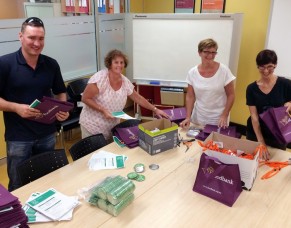Collective Impact
Building on the success of 50 Lives 50 Homes which resulted in 238 rough sleepers being housed over four years, in 2014, a coalition of government and nongovernment agencies set a goal to house 500 individuals and families in three years.
The campaign began with a community-wide registry where local agencies and volunteers surveyed 961 families, young people and adults in the Brisbane Local Government area who were homeless or vulnerably housed. Since then, a further 1,733 people have been registered through the campaign.
Three years on, the campaign has exceeded its goal by housing 580 individual and family households.
The community has applied Housing First principles to assist 373 individuals and 207 families with 430 children to end their homelessness.
How did we do this?
By working together to use our resources within a Housing First approach which promotes linking people with affordable housing, healthcare and the community services they need to sustain their tenancy and improve their quality of life.
Housing First involves the rapid identification and provision of suitable, long-term housing, coupled with the necessary services that individuals and families require to maintain this housing. Crisis services can focus on getting people through a crisis and into housing or in many circumstances individuals or families can be diverted from the homelessness service system directly into a house with their own lease. Services collaborate to support people to meet their obligations as tenants and improve their quality of life through connection with services, friends and community.
This approach harnesses the power of permanent, safe housing to help people recover and heal from the trauma of homelessness. It gives them a safe space in which to address the issues that may be stopping them from living the lives they want.
Our campaign prioritised the most vulnerable individuals, children and their families who were experiencing homelessness. It set us a challenge to remove the often arbitrary barriers to housing and commit to service improvement so as to end each person’s homelessness as quickly as we could.
There is extensive evidence for Housing First in the United States:
Read how Supportive Housing is Cost Effective
This evidence has shown that Housing First delivers better housing outcomes, while generally costing less than keeping people homeless. Keeping people homeless represents a major drain on our health and community services, due to the physical and mental strain on people who have no safe space to live. People who have accessed permanent, safe housing make less frequent use of expensive, publicly funded services like emergency departments and prisons.
Evidence from Australia is growing and has demonstrated that this is a model that works well in our community and is delivering positive outcomes for people experiencing homelessness. Brisbane has been leading the way through the investment into increasing the supply of housing, funding services, and great community support.
Read an Evaluation of Brisbane’s Street to Home Program.
There has been great progress since the initial 50 Lives 50 Homes campaign in 2010. We have also gained substantial knowledge of the housing and support needs of people experiencing homelessness.
People experiencing homelessness in Brisbane:
- Have spent an average of 6 years homeless
- 30% had a brain injury or a history of head trauma
- 7% have cancer
- 67% have a serious health condition
- 19% have heart disease or arrhythmia
- 38% are tri-morbid, with a co-occurring psychiatric and substance abuse disorder coupled with a chronic physical health condition
Housing is essential to end homelessness and provide healthcare and community services to those who need it. For the most vulnerable individuals housing provides a place to be cared for and to die with dignity. For children and their families it provides a home and community to support their journey as a family.
Housing First allows us to respond in a respectful way that provides dignity as well as a foundation to build upon their own aspirations, recover from trauma, build their future and be active citizens in our community.
Read Housing First: A roadmap to ending homelessness in Brisbane.
Back to top